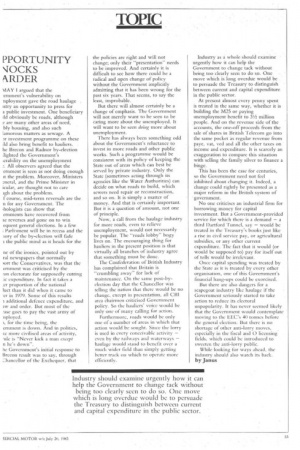PPORTUNITY \TOCKS NRDER
Page 55

If you've noticed an error in this article please click here to report it so we can fix it.
VIAY I argued that the
-ertiment's vulnerability on nployrnent gave the road haulage [stry an opportunity to press for a public investment. One beneficiary [Id obviously be roads, although C are many other areas of need, bly housing, and also such [amorous matters as sewage. A 3r investment programme on these [Id also bring benefit to hauliers. he Brecon and Radnor by-election Llighted the Government's
Lerability on the unemployment
All observers agreed that the ernment is seen as not doing enough it the problem. Moreover, Ministers tneral, and the Prime Minister in icular, are thought not to care igh about the problem.
f course, mid-term reversals are the n for any Government. The liologists can show that
ernments have recovered from se reverses and gone on to win equent general 'elections. In a few. Parlilrnent will be in recess and the aory of the by-election will fade a the public mind as it heads for the
ne of the ironies, pointed out by ral newspapers that normally )ort the Conservatives, was that the eminent was criticised by the on electorate for supposedly cutting .ic expenditure. In fact it takes a 1:'r proportion of the national luct than it did when it came to
.cr in 1979. Some of this results
additional defence expenditure, and
AW and order. But most of the
.!ase goes to pay the vast army of nployed.
), for the time being, the emment is down. And in politics, <.e more civilised areas of activity,
-ule is "Never kick a man except
n he's down".
Fie Government's initial response to Brecon result was to say, through :hancellor of the Exchequer, that the policies are right and will not • change; only their "presentation" needs to be improved. And certainly it is difficult to see how there could be a radical and open change of policy without the Government implicitly admitting that it has been wrong for the past six years. That seems, to say the least, improbable.
But there will almost certainly be a change of emphasis. The Government will not merely want to be seen to be eating more about the unemployed. It will want to be seen doing more about unemployment.
There has always been something odd about the Government's reluctance to invest in more roads and other public works. Such a programme would be consistent with its policy of keeping the State out of areas which can best be served by private industry. Only the State (sometimes acting through its agcncies like the Water Authorities) can decide on what roads to build, which sewers need repair or reconstruction, and to on. It is simply a matter of money. And that is certainly important. But it is a question of amount, not one of principle. Now, a -call from the haulage industry for more roads, even to relieve unemployment, would not necessarily be popular. The "roads lobby" bogy lives on. The encouraging thing for hauliers in the present position is that virtually all branches of industry agree that something must be done.
The Confederation of British Industry has complained that Britain is "crumbling away" for lack of maintenance. On the same post-byelection day that the Chancellor was telling the nation that there would be no change, except in presentation, all C1-3I area chairmen criticised Government policy. So the hauliers' voice would be only one of many calling for action.
Furthermore, roads would be only one of a number of areas in which that .action would-be sought. Since the lorry is used in every conceivable activity — even by the railways and waterways — haulage would stand to benefit over a 'much wider field than simply getting better track on which to operate more efficiently.
Industry as a whole should examine • urgently how it canIelp the Government to change tack without being too clearly seen to do so. One move which is long overchie would be . to persuade the Treasury to distinguish between current and capital expenditure in the public sector.
At present almost every penny spent is treated in the same way, whether it is • building the M25 or paying unemployment benefit to 31/2 million . people. And on the revenue side of the accounts, the one-off proceeds from the sale of shares in British Telecom go into the same pocket as regular revenue from paye, vat, ved and all the other taxes on • income and expenditure. It is scarcely an exaggeration to compare this situation with selling the family silver to finance a binge.
This has been the case for centuries, so the Government need not feel inhibited about changing it. Indeed, a change could rightly be presented as a major reform in the British system of government.
No one criticises an industrial firm for borrowing money for capital investment. But a Government-provided service for which there is a demand — a third Dartford Tunnel, say — would be treated in the Treasury's books just like a rise in civil service pay, or agricultural subsidies, or any other current expenditure. The fact that it would (or would be supposed to) pay for itself out of tolls would be irrelevant.
Once capital spending was treated by the State as it is treated by every other organisation, one of this Government's financial hang-ups could be exorcised.
But there are also dangers for a -scapegoat industry like haulage if the Government seriously started to take action to reduce its electoral unpopularity. It has 'never seemed likely that the Government would contemplate moving to the EEC's 40 tonnes before the general election. But there is no shortage of other anti-lorry moves, especially in the fiscal and 0 licensing fields, which could be introduced to
sweeten the anti-lorry public. While looking for. ways ahead, the industry should also watch its back. by Janus




















































































